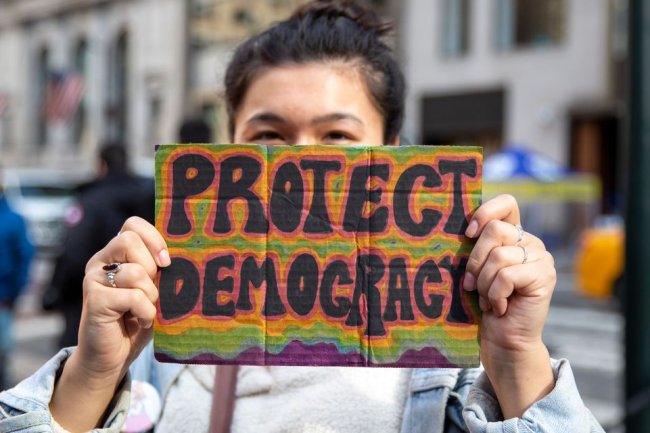H-2A Guest Workers Can Pick Florida’s Crops
Farmers complain about the state’s illegal-immigration law, but there is an alternative. By Dave Seminara Aug. 4, 2023 2:12 pm ET A woman works on a farm in Homestead, Fla., May 23. Photo: cristobal herrera-ulashkevich/Shutterstock St. Petersburg, Fla. Who will harvest the crops? This powerful refrain comes up anytime conservatives propose or enact tough measures to combat illegal immigration. Florida’s new law, SB 1718, which went into effect July 1, is a case in point. The law invalidates out-of-state driver’s licenses given to illegal immigrants, requires hospitals to quantify uncompensated care given to them, and compels employers with at least 25 employees to use E-Verify to check the legal status of new hires, among other measures. A previous bill mandating the use of E-Verify, SB 664, exempted agriculture employers. But thi


A woman works on a farm in Homestead, Fla., May 23.
Photo: cristobal herrera-ulashkevich/Shutterstock
St. Petersburg, Fla.
Who will harvest the crops? This powerful refrain comes up anytime conservatives propose or enact tough measures to combat illegal immigration. Florida’s new law, SB 1718, which went into effect July 1, is a case in point. The law invalidates out-of-state driver’s licenses given to illegal immigrants, requires hospitals to quantify uncompensated care given to them, and compels employers with at least 25 employees to use E-Verify to check the legal status of new hires, among other measures. A previous bill mandating the use of E-Verify, SB 664, exempted agriculture employers. But this one doesn’t, and some Florida farmers are furious.
A grower in Homestead, near Miami, complained to a Telemundo reporter, “Who’s going to harvest?” The owner of a produce-packaging facility in South Florida kvetched to a Journal reporter, “How are we going to run the farms?” Even Republican state Rep. Rick Roth, who voted for the bill, said he’s upset that fearful farmworkers without legal status are leaving the state because of the bill.
“I’m a farmer, and the farmers are mad as hell,” Mr. Roth said. “We are losing employees. They’re already starting to move to Georgia and other states.”
Employers in other sectors are also unhappy with the new law. But Democrats, and some Republicans, have long used farmers’ staffing needs to argue against E-Verify and other tools to combat unlawful migration. Even George W. Bush invoked the plight of farmers to make this point in 2018. “Americans don’t want to pick cotton at 105 degrees, but there are people who want to put food on their family’s tables and are willing to do that,” he said at a 2018 summit in Abu Dhabi.
Thanks to inflation and soaring grocery bills, the prospect of food shortages and price increases is real. But farmers and their allies in the media seldom acknowledge that they have a powerful employment tool in the H-2A visa to import guest workers. Unlike the H-1B visa for skilled labor and the H-2B for unskilled labor, the H-2A is uncapped. Farmers can theoretically bring in all the labor they need, as long as they can prove they can’t find local workers.
The media largely ignores the H-2A visa because it contradicts the preferred narrative about unlawful immigration. The same is true of the TN visa, another fast-growing, numerically unlimited guest-worker program for Mexican and Canadians in dozens of skilled professions. But more employers are discovering these programs. A decade ago, the State Department approved 77,010 H-2A visas. In fiscal 2022, the figure climbed to 298,000. This year, employers are on pace to shatter that record. In the first five months of the year, the State Department approved 163,792 H-2A farmworkers from Mexico alone.
The program figures to grow in popularity as more red states crack down on illegal immigration. H-2A workers are less likely to quit than illegal immigrants or local hires because their legal status is tied to their employment, and they are authorized to work only for the petitioning employer for up to three years at a time. Farmers like that.
What they don’t like is the program’s complexity. The requirements are bewildering for most farmers, who typically hire immigration attorneys to navigate the red tape. Farmers must demonstrate that they tried to recruit workers locally—though unappealing, pro forma job ads usually work. They also must not have laid off American workers within 60 days before petitioning. The Labor Department requires farmers to meet prevailing-wage requirements and provide free housing and meals or cooking facilities to H-2A recipients. Employers also must submit to annual preoccupancy inspections of worker housing to get the labor certification they need to secure guest workers.
Some farmers would rather pay illegal workers in cash and risk an Immigration and Customs Enforcement raid than invite government scrutiny of their operations. The threat of ICE raids has receded significantly under the Biden administration, so it’s easy to see why SB 1718 is unpopular with Florida growers. Still, their complaints seem overblown. The law applies only to new hires and not existing employees—a fact that most media outlets haven’t made clear, causing unnecessary panic among migrant farmworkers.
Florida’s new law doesn’t apply to employers with fewer than 25 employees. Last year the Labor Department changed H-2A rules allowing groups of small farmers to file a single petition and share the costs of importing guest workers.
Those outraged by Florida’s new law should instead champion programs like the H-2A visa. Legal workers in a program with plenty of labor-protection standards are far less likely to be exploited than workers with no legal status. It remains to be seen how the law will affect Florida farmers, but many who’ve become addicted to illegal labor could soon start hiring legally. That would be a nice change.
Mr. Seminara is a former diplomat and host of the “DeSantisland” podcast.
Wonder Land: The United States is often described as a 'nation of immigrants,' but with Biden’s open river or another Trump wall, the clock on American pre-eminence could stop, as illegal immigration taints the legal path to citizenship. Images: AFP/Getty Images/Zuma Press Composite: Mark Kelly The Wall Street Journal Interactive Edition
What's Your Reaction?






















